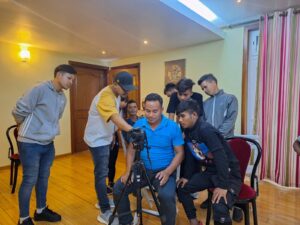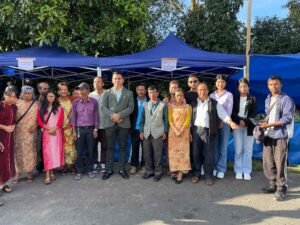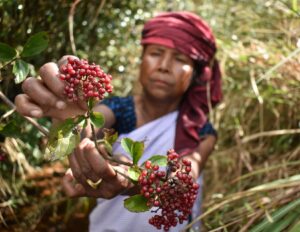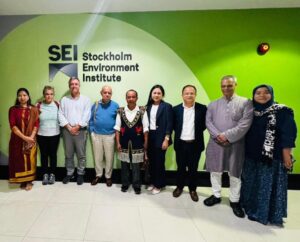Since 2014, NESFAS has been empowering rural youth through its Participatory Video (PV) program. This initiative aims to document local stories, promote sustainable food systems, and raise awareness about climate change. By training young community members in basic scripting, videography, and editing, NESFAS fosters grassroots journalism and preserves indigenous knowledge through this initiative.
The PV program addresses several critical issues. Firstly, it highlights the absence of representation by ensuring that local culture, biodiversity, and practices are properly documented and showcased. Secondly, it grants communities control over their narratives, enabling them to authentically portray their realities and challenges. Lastly, it empowers youth by equipping them with valuable skills that not only open up employment avenues but also help in curbing youth migration and lack of representation.
Historical Context
Over the past decade, NESFAS has trained many youths, many of whom now work as videographers and photographers for NESFAS, documenting various programs and community events. This initiative has successfully created a cadre of skilled individuals dedicated to preserving their heritage and contributing to sustainable development. More than 30 youth have been trained and 50 participatory videos have been produced as part of this initiative.
The 2024 PV Training Program
From May 13th to 18th, 2024, NESFAS conducted an intensive PV training program at their office in Shillong, with ten enthusiastic youths from various villages in East Khasi Hills and Ri Bhoi participating. This year’s training is part of the NESFAS 3-year initiative “Demonstrate successful community-based initiatives and innovate to create healthy and sustainable food systems to conserve/manage biodiversity, build climate resilience, improve nutrition and local livelihoods” supported by Indigenous Peoples Assistance Facility (IPAF) of UN-IFAD. It aimed to enhance their ability to document local stories and promote sustainable practices.
The program began with an introduction session, where participants shared their backgrounds and motivations. Alethea K Lyngdoh, Deputy Executive Directorat NESFAS, provided an overview of the organization’s mission and initiatives, setting the stage for a week of collaborative learning.
There was an important focus on climate change, with Naphishisha Nongsiej, Associate, and Pyniarbor Kharshiing, Jr. Consultant, leading sessions on its impact and mitigation strategies. Participants learned about the crucial role of Indigenous Peoples’ Food Systems in combating climate change and discussed actionable steps to implement in their communities.
Merrysha Nongrum, Sr. Associate at NESFAS, introduced the concept of Participatory Video, emphasizing its role in promoting agrobiodiversity and preserving cultural heritage. Gratia Dkhar, Sr. Associate Programme at NESFAS, provided insights into the current project and the TAPE study, highlighting the importance of empowering rural youth. Other sessions included storytelling and documentary films facilitated by Worngachan Shatsang, Content Writer, NESFAS and Riteilang Khongrangjem, Local filmmaker, respectivly.
The training also covered technical skills in great detail. Alethea K Lyngdoh led a session on scriptwriting, teaching participants how to create engaging and impactful content. Bajanai Diengdoh, Communications, conducted a session on basic photography skills, instructing participants on camera shots and photography tips.
Dr. Kit Nongrum’s (Technical Lead, Conservation Biologist) session on plant photography trained participants in capturing images of important plant phenology, crucial for species identification and documenting seasonal crops and plants. Participants practiced using cameras and mobile phones, reinforcing their learning. Eddie Kharsyntiew from The Hills People Collective (THPC) introduced participants to the basics of photography and videography, covering key elements and fundamental techniques. Practical sessions allowed participants to apply their theoretical knowledge, enhancing their hands-on experience.
The final day was dedicated to basic video editing, with Naphi Mawroh from THPC. Participants learned how to create and organize projects, import video files, and use basic editing tools. Naphi commented, “They were very attentive and quick to learn. It was a great interaction, and I was pleased to guide and motivate them through my own experiences.”
Voices from rural youth
Daiolin Jyrwa, youth fromMawbri, East Khasi Hills, reflected on the transformative experience: “We have gained a great deal of knowledge from the seniors during our training at NESFAS. I’m proud of the week I spent learning how to operate a camera, edit, and—most importantly—how to protect the environment and uphold our customs and culture.”
Belarius Bey, youthfrom Umwang Nongbah, Ri Bhoi, shared, “I felt very excited when I attended the NESFAS PV program. I benefited greatly from learning about preserving the trees, nurturing Mother Nature, and also from photography, editing videos, and how to shoot a video.“
Impact and Future Outlook
The NESFAS PV training program exemplifies the transformative power of storytelling and visual communication. Through immersive learning experiences and hands-on skill development, participants emerged as empowered advocates for their communities. As they embark on their journey to create impactful visual narratives, they carry with them the knowledge, passion, and determination to effect positive change.
This program not only equipped them with technical skills but also ignited a sense of purpose and belonging, fostering a community of storytellers dedicated to preserving indigenous knowledge and culture. As the participants return to their villages, they carry with them a renewed sense of purpose and responsibility, inspiring others to join the movement for a healthier, more sustainable future.




